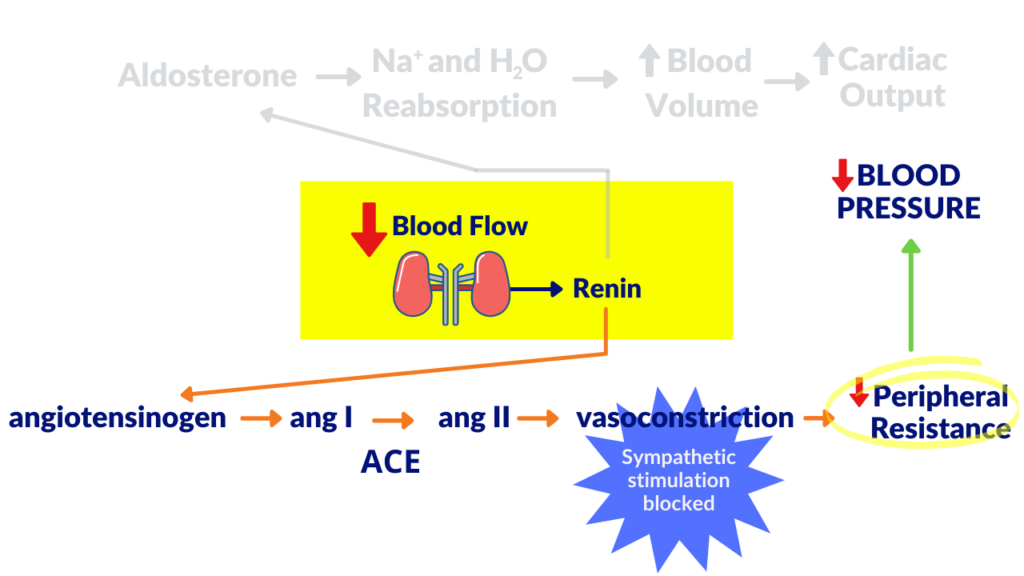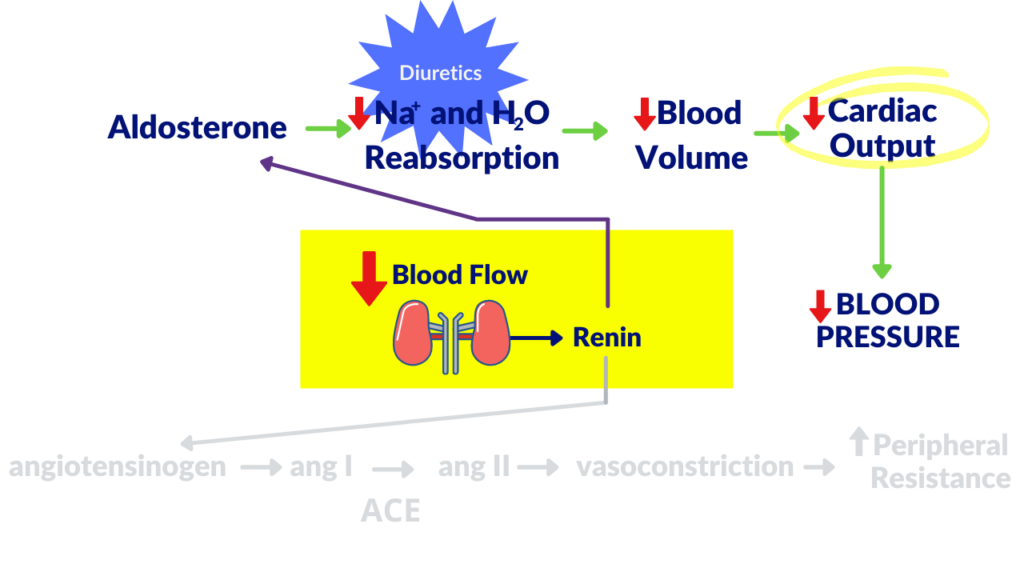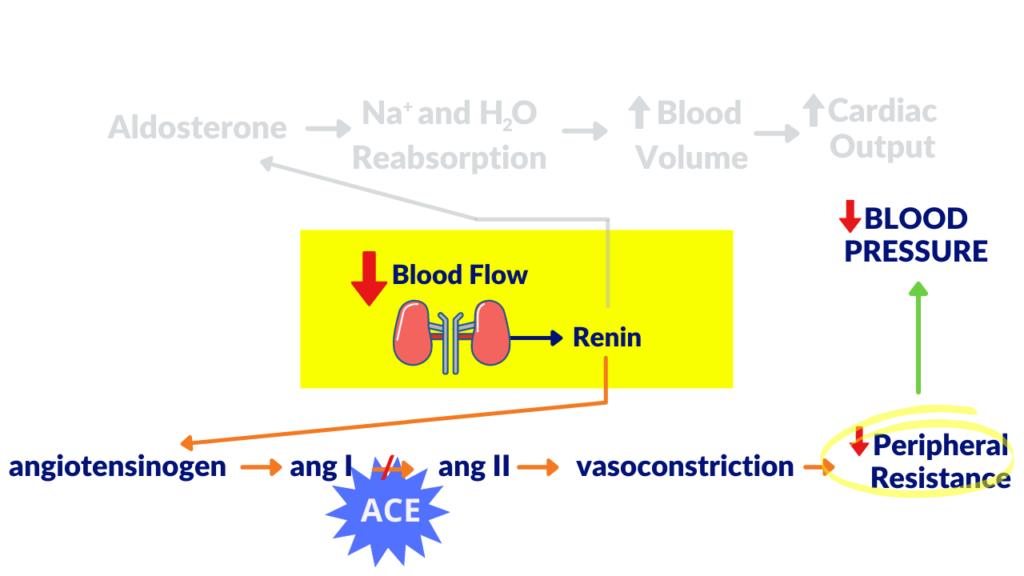What are the mechanisms that underlie the drugs that are used to treat hypertension? Drugs like ACE inhibitors, diuretics, and beta-blockers? That’s what we cover in this video.
Topics covered in this video:
- The Problem with Hypertension
- Treatment of Hypertension: Lifestyle Modification
- Treatment of Hypertension: Drugs
The Problem with Hypertension
I want to talk about the treatment of hypertension. Here is the problem with hypertension.
Hypertension is often undiagnosed because of the fact that the symptoms are very vague. Symptoms like fatigue, light-headedness, headaches, and those types of things are what you usually have and it’s not really giving you any significant signs until you have serious problems.
Now, when it comes to treatment, there are a number of things that can be done.
Treatment of Hypertension: Lifestyle Modification
The first thing that we can look at is some lifestyle modifications and how these affect general cardiovascular health. So, we’re dealing with things like:
- stopping smoking
- weight reduction or weight loss
- regular aerobic exercise
- reduction in caffeine / coffee intake
- reduction in sodium / salt intake
- eating well
- Eating fruits and veggies. Of course, it’s not just fruits and veggies but, that’s a good staple in terms of thinking about health.
Some of these general things that we can do are going to help with preventing, help with reversing the effects of hypertension.
Now, of course, in some cases, it’s going to be a little more advanced than these lifestyle modifications. Yes, you want to make them but, in some cases, you’re going to need some extra help.
We’re going to talk about some of the drugs that can be taken to really help with hypertension. So, let’s take some examples.
Treatment of Hypertension: Drugs
We spoke about this in a previous video where we showed that blood pressure is equal to cardiac output times peripheral resistance. If you increase any of these, you’re going to increase blood pressure.
Now, on the flip side, if one of these is increased and that’s causing an increase in blood pressure, what you want to do is reduce one or both of these values so that, that can reduce the blood pressure and stop it from getting any worse.
There are a number of ways to do this using pharmacological agents or drugs.
First, I want to talk about those that are going to decrease peripheral resistance, or at least stop that from increasing.
Drugs Affecting Peripheral Resistance
ACE Inhibitors
These types of drugs inhibit the angiotensin-converting enzyme (ACE). They are essentially knocking these enzymes out so that we’re not getting the conversion of angiotensin I to angiotensin II which is such a potent vasoconstrictor that is going to increase peripheral resistance significantly.
We’re stopping this process from happening so that peripheral resistance can be decreased or at least, not increased any more.
That is the result of using the class of drugs that we call, ACE inhibitors.
Drugs That “Block” Sympathetic Stimulation
There’s another class of drugs that’s going to also work against this increase in peripheral resistance and those are drugs that are going to “block” sympathetic stimulation.

Sympathetic stimulation normally causes vasoconstriction. Hence, stopping sympathetic stimulation reduces the amount of vasoconstriction and in essence, decreases peripheral resistance.
Those are two different types of drugs that are going to work to reduce peripheral resistance. Reducing peripheral resistance also reduces blood pressure helping to stop the cycle from continuing.
Those are drugs that are going to affect peripheral resistance.
Drugs Affecting Cardiac Output
Let’s talk about some drugs that are going to affect cardiac output.
Diuretics
What is that going to cause?
Diuretics cause an increase in urination. If you cause an increase in urination, what you’re basically doing is counteracting this process where we’re going to have an increase in water reabsorption.

Instead of having an increase in water reabsorption, we’re going to have an increase in water secretion. So, water won’t be going back to the bloodstream. Along with sodium, it’s going to be leaving. So, we’re going to cause sodium ions to leave, and as a result, water is also leaving.
If that is happening, that is going to cause a reduction in blood volume, and as a result of that, a reduction in cardiac output and a reduction in blood pressure. So, we’re stopping the process in terms of decreasing the cardiac output.
Beta-Blockers
Another way of affecting cardiac output more directly is with a class of drugs that are called beta-blockers.
Beta-blockers block the beta receptors on the heart. Beta receptors are responsible for responding to sympathetic stimulation, that’s fight or flight. It’s speeding things up. It’s causing increased contraction of the heart.
If you’re blocking those beta receptors, we are basically going to be decreasing the cardiac output because the heart will not contract as strongly. As a result of that, we’re decreasing the cardiac output, decreasing the blood pressure, so we’re stopping the process right here, or counteracting the process right here.
Summary
So, those are some of the drugs that are used, some of the main types of drugs. We have:
- Drugs that decreases peripheral resistance such as:
- ACE inhibitors
- Drugs that block sympathetic stimulation basically in essence either knocking out or reducing the effect of that angiotensin converting enzyme (ACE) and reducing the amount of vasoconstriction.
- Drugs that affect cardiac output:
- Diuretics causing more water excretion.
- Beta-blockers that are going to reduce the amount of the strength of contraction of the heart.
So, there you have it. That’s it for this video. I’ll see you in the next one.



Dear Mr. Samuel: I need your valued guidance. I am 66 year old female whose right ear has developed some ‘vibrating/rattling’ sound that generates every other second after some peculiar pulsation sound like ‘tick, tick’ that converts into this rattling, vibration sound. It arises and subsides continuously.
I have searched for an explanation and solution to this stressful phenomenon and have stumbled upon your u tube video streams. Please reply this appeal of mine . I hope and pray that you will receive and read this comment and respond. Thanks. Swaprabhananda
Awesome.
Hi Neelam,
I don’t know what that would be. Also, I intentionally don’t give any kind of medical advice because of the liability issues that can arise.
Leslie,
No more coffee or energy drinks in the afternoon. 1 cup of coffee in the morning. My adrenal gland fatigue I.E. Afternoon bonk Begone… Vanished. Also the psychological dependency of that caffeine Intake is gone. Amazing how the psychological dependency is far worse than the actual physical dependency The caffeine intake. 6 months to kick the Psychological dependency of caffeine….. Or bad habit if you wanna call it that.
Luv this episode!
Dear Mr. Samuel: i am from sri lanka and what i want to know is, why is salt not good to our health and how to reduce it..
The elderly need to be more careful for the blood pressure.
“Stop smoking” might be the most effective method for me. Health is the most important.
http://www.biotechsciencenews.com/Person/list/edit/75044_My_Blog_38.html